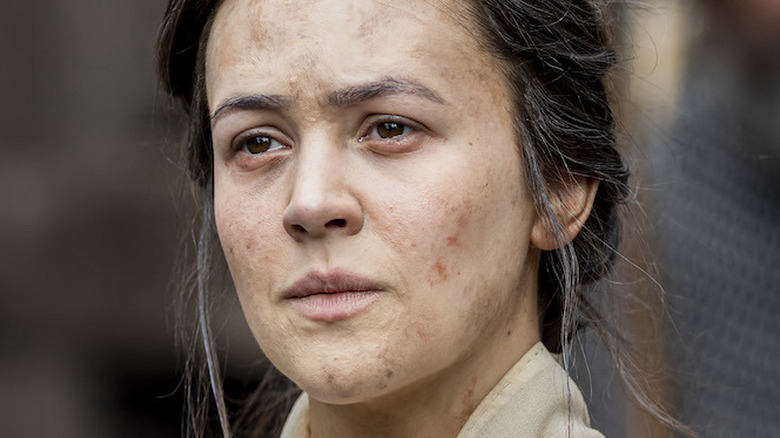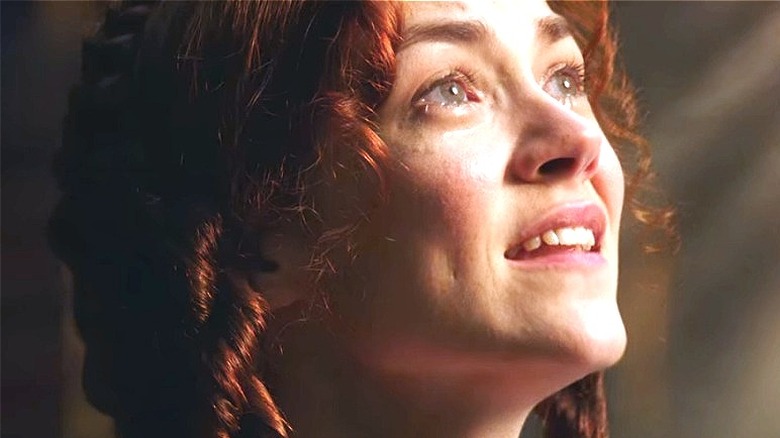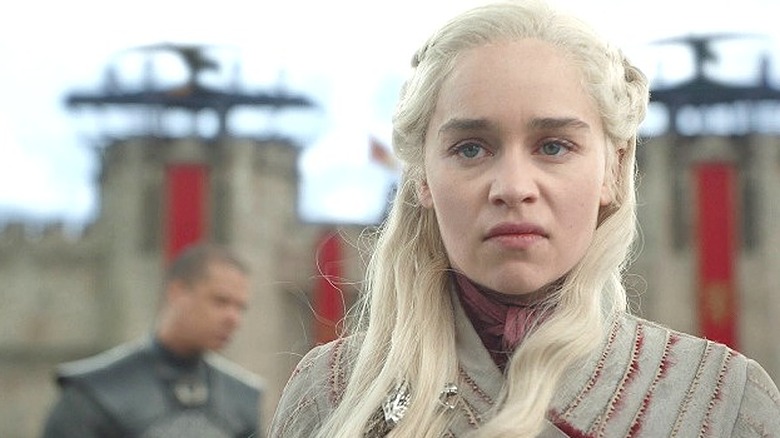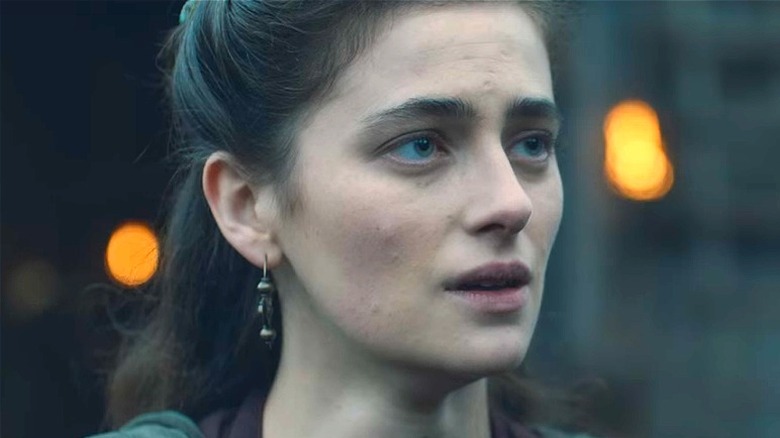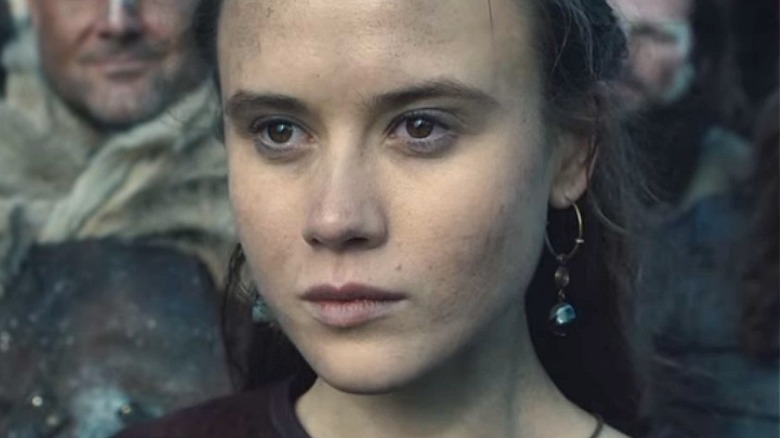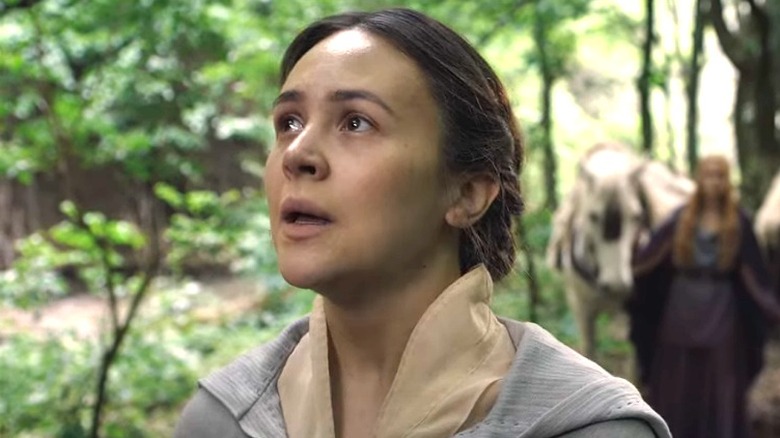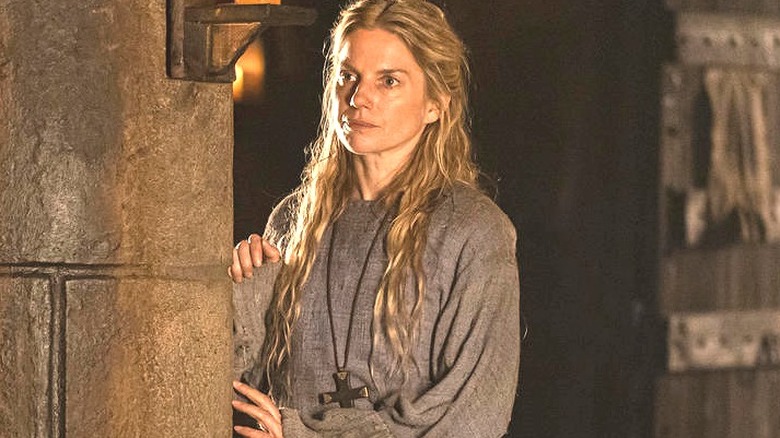The One Medieval Drama On TV That Stands Above All The Competition
When HBO's "Game of Thrones" debuted in 2011, it launched a resurgence of interest in medieval and medieval-inspired narratives in much the same way J.R.R. Tolkien's "The Hobbit" and "The Lord of the Rings" reignited a mid-century interest in the more fantastical elements of Arthurian literature. Though both phenomena incorporate and rely on fantasy, the cues they take from actual European history are integral to their mechanics, and ultimately helped to blur the line between medieval-based historical fiction and historically-inspired medieval-based fantasy. It came as little surprise, then, that in addition to "Game of Thrones," other historically-based and sourced epic series such as History's "Vikings" and "Knightfall" (and, later, "Vikings: Valhalla") burst on to the network and streaming scene.
Though there's much to be said about some of these series, both they and their genre as a whole have failed audiences (the latter since its inception), in a very particular way: for all their seeming promotion of "strong female characters," not a single one of them succeeds in imbuing these women the inner worlds, complexity of emotion, and actual agency afforded to male protagonists. But there is one new series out there that rejects these one-dimensional, either/or archetypes that have for so long informed the genre's depiction of women.
The Last Kingdom proves antiquated archetypes don't have to define the genre
The show in question is Netflix's similarly-inspired but vastly different "The Last Kingdom" — an adaptation of author Bernard Cornwell's historical fiction series. So how does it stand out from the rest?
Firstly, it's not surprising that shows engaged in medieval storytelling should give us such one-dimensional female characters. The historic and literary traditions they're founded upon — namely, the legacy of 12th- and 15th-century Arthurian literature and the 13th-century Icelanders' sagas (both of which were heavily influenced by Christianity, despite the latter's pagan subject matter) — put forth characters who aren't meant to be seen as human, but as symbolic or allegorical. What's more, since they take their cues from (the medieval world's interpretation of) the Christian Bible, it's equally unsurprising that such traditions reduce even their most heroic women to flat and easily categorized archetypes: e.g., the virgin (Mary) or the whore (Eve), repackaged frequently in contemporary series as the vengeful warrior/noble or the manipulative seductress/witch.
All this might justify these series' flat female characters were it not for two inarguable realities: these shows don't have this problem when it comes to their male characters, and, as "The Last Kingdom" proves, it's entirely possible to construct fully-developed, powerful female characters while staying true to the period's historic source material and realities. If anything, "The Last Kingdom" is, in its dependence on Bernard Cornwell's own nonfiction source material ("The Saxon Chronicles" and the Welsh scholar Asser's biography of Alfred the Great, per Britannica), more confined by the era's restriction of women than most. And yet, by allowing its female protagonists to exhibit genuine, singular humanity and depict a vast range of different kinds of strength, the series assumes and proposes that the women of the past were any less fully-dimensional than contemporary women. Sadly, the same cannot be said for the majority of its contemporaries.
The genre (hasn't) come a long way, baby
"Game of Thrones," for instance, failed to give its strong female characters the complexity and realism of, say, Peter Dinklage's Tyrion Lannister or Aidan Gillen's Petyr Baelish. These men are both cut from the same cunning and clever cloth but possess vastly different motivations and viewpoints. By contrast, Sophie Turner's Sansa, the stock virgin, transforms into the equally stock political warrior only after she suffers egregious abuses at the hands of men. Emilia Clarke's Daenerys follows a similarly simplistic A to B path, and it happens to be the same path — or so it's repeatedly implied — that Lena Headey's Cersei took before her. In fact, save the overtly and intentionally Arthurian archetypes of Gwendoline Christie's Brienne and Carice van Houten's Lady of the Lake-esque Melisandre, all the (non-decorative) women of the series are driven — and characterized — solely by the actions of men. The problem isn't (entirely, anyway) that the series mistreated its female characters, but that it never allowed them to rise above one of two tired, toxic tropes.
This polarity popped up again in "Vikings," in its stock vengeance warrior (Katheryn Winnick's Lagertha) vs. its stock seductress/witch (Alyssa Sutherland's Queen Aslaug), while "Vikings: Valhalla" kicked off with a "strong female protagonist" whose defining character trait was a response to her victimization. Finally, in History's blessedly short-lived "Knightfall," Sabrina Bartlett's Isabella and Olivia Ross' Joan are little more than inane iterations of Guinevere: the righteous woman driven to sin by her inability to deny her carnal impulses (again, see: Eve).
The Last Kingdom rejects tired tropes
The women of "The Last Kingdom" — women like Eva Birthistle's nun Hild, whose power comes not from her (quite justified) anger, but from her refusal to let hate disillusion her — are messy, relatable, dynamic, and varied people. Like Hild, Emily Cox's Viking Brida is also firm in her faith but driven by a complex combination of grief, betrayal, loneliness, and a crisis of identity for which she's eternally compensating. Importantly, Cox's character is at her strongest immediately following her lowest point. In her final confrontation with Uhtred (Alexander Dreymon), she somehow finds the strength to forgive him (sadly, just before she's killed). It may not be as obvious a "flex" as impulsively decimating a city via a fire-breathing dragon, but it is, in both its humanity and vulnerability, infinitely more real and powerful.
Brida's foil, Millie Brady's real-life Lady of Mercia, Aethelflaed, is neither written in simple relief of Brida nor characterized solely by the era's misogyny. In Aethelflaed, we see yet another distinct depiction of power and strength, albeit one far more subtle than that offered by an action figure shield maiden or evil queen. Not only does Aethelflaed give up the love of her life, but she also meets her own mortality with grace and humility typically reserved for only the most traditional (read: male) of tragic heroes. While other series manage "sacrifice as strength" in their female protagonists, that sacrifice is typically made in service of a man or child (e.g., Maude Hirst's Helga) — not for the love and protected peace of a kingdom.
Stiorra and Eadith defy their archetypes
In Ruby Hartley's Stiorra and Stefani Martini's Eadith, "The Last Kingdom" even manages to put a fresh twist on the age-old warrior/virgin and sorceress/whore archetypes. It's no accident that both characters make a show of dismissing the notion of "destiny," as if the series is openly freeing them from the trope-y romantic molds into which they were born.
For her part, Uhtred's Viking daughter Stiorra — despite losing her husband to her own father's loyalties — decides not to let the unjust actions of men define her. Though she does take her revenge on Brida, it's an act she sees simply as a necessary means to achieving a conclusive peace. By leading her Viking followers into the woods and refusing to follow her father's orders, Stiorra proves she's more than a mere warrior; she's a leader capable of both strategic thought and forward thinking, and one every bit as confident in her convictions as the Saxon King. Still, she is human, and when the most unlikely character begs for her help, she too finds the strength to forgive — a decision that has a major impact on the series' portrayal of English history.
As for Eadith, who's initially presented as a seductress, it quickly becomes clear that she sees herself differently. In the end, she leaves England to study as (a medieval version of) a doctor and returns to the island not as any kind of decorative, sexy romantic interest, but as an invaluable mind and resource.
Aelswith is one of the genre's most dynamic characters to date
While all of the series' women boast a complexity atypical of the genre, it's Eliza Butterworth's Aelswith who most thoroughly embodies the commitment of "The Last Kingdom" to seeing women as human. In the show's first two seasons, Aelswith's aggressive piety and subsequent hatred of "the heathen" Uhtred sets her up as a series antagonist. Over time, however, she draws on a strength that surprises even her, ultimately becoming the catalyst for much of the series' action, while discovering new ways to maneuver around her era's restrictions and bring some semblance of reason to its politics. Importantly, she manages this growth on her own terms, and not as a reaction to trauma suffered at the hands of men (though she certainly suffers at their hands).
Aelswith falters in her convictions only once, after the untimely death of her daughter, and it's in her vulnerability that she finds the strength necessary to trust her longtime foe. It's that very vulnerability, coupled with the realistic pace of her evolution, that ultimately propels Aelswith from a woman motivated by blind faith and fear into one of the series' strongest and most aspirational characters. In later seasons, Aelswith even develops a sense of humor, a characteristic the genre (and in fact, most any genre) rarely affords its strong female characters.
Not only does "The Last Kingdom" give those characters the same humanity it gives its men, it frequently uses them to call out the genre's centuries-old failure to do the same.
The Last Kingdom calls out contemporaries
In a revealing Season 5 scene, Aelswith recalls her first and only kill. "I drove a knife through his neck," she says, adding, "I was not wearing gloves." The scene marks an important, tongue-in-cheek milestone for the character: her transformation from pious virgin to fierce warrior is now complete, the series says, in the most subversive way possible.
To be clear, the women of "The Last Kingdom" are treated just as poorly by their society as the women of any other medieval series. It's their differing reactions to this injustice, and the writers' refusal to use that reaction as the defining characteristic of their being and narrative, that sets the series apart.
When Geoffrey of Monmouth and Sir Thomas Malory were defining the Arthurian literary tradition (via Britannica), they were writing from 12th and 15th-century societies that either feared and condemned women for their alleged inherent sin or wrote them into pure, pious fantasies. That so many modern takes on the genre should fail to reject their predecessors' portrayals is, in a manner that borders on comedic, an unintentionally ironic furtherance of the same misogynistic, mythic attitudes toward women that these shows so apparently believe they are dispelling. And be it through intent or ignorance, there is something deeply sinister about dressing women up in the transparent trappings of agency and depth — and in gaslighting audiences into believing you've done something revolutionary — while promoting a hollow, harmful depiction and understanding of half the world's population.
